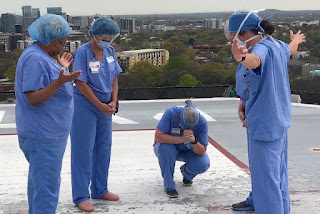Nurses awaiting helicopter, FaceBook
The current
coronavirus pandemic certainly has given all of us around the world a focus and
heightened appreciation for all of our caregivers in a multitude of specialties. And in this time of world-wide digital
communication we’re now in close touch with those on the battle fields fighting
for those stricken with the virus. Some
of them are saying that those that stay at home and do not facilitate the
movement of the virus are on the front lines and that they are behind the lines
caring for the patients that are seeking medical treatment.
Observing this
crisis unfold called to mind a response of the famous anthropologist Margaret
Mead when a student asked what she considered to be the first sign of
civilization in a culture. Excavations
of ancient sites have uncovered the remains of fire pits, flint stones used for
hunting and tools, clay shards, etc. But
she didn’t use any of these common examples.
Instead she replied that it was a healed thigh bone. She explained that in evolving cultures a
broken leg was a certain death sentence in the animal world. “Helping someone through a time of crisis is
where civilization starts”, she concluded.
Heroes aren’t
born. They’re created in times of strife
and struggle. We humans are hardwired
for empathy. And research has noted that
when we observe others suffering, our brains are stimulated so that we
experience the pain ourselves.
There’s a great
void between empathy and apathy. People
seem to have a range within which we can nurture either trait. Learning new skills will grow parts of our
brain for instance. Practicing
generosity, concern for strangers and others’ emotions grows our ability to
create a kinder world. And empathy is
primary in the caregiving profession. I
still remember a senior ICU nurse that came into my room around midnight after
major surgery and talked for quite a while to assure me that everything would
be OK.
But full time caring
for the sick and being witness to dying patients will take a toll on our
caregivers, demanding our own empathy for them.
I was witness to friends when the husband was terminally ill and
required a demanding amount of time and energy from his wife. She actually passed away before him. And our oncologist that worked tirelessly
with my wife to seek treatments for her metastasized breast cancer was said to
have a terrible bedside manner and lack of empathy. Once we spent time understanding his world,
we came to realize that we too would have to emotionally detach ourselves from
multiple patients with critical diseases for our own sanity. Nevertheless, when the end was near, he still
revealed his underlying humanity we had appreciated all along and for which I was
grateful.

No comments:
Post a Comment